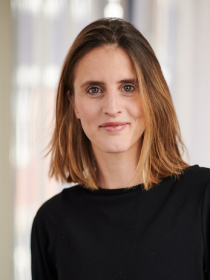dr. L. (Lea) Diestelmeier

December 2022-Novembr 2026: Training for a Hydrogen Economy based Renewable Energy Society in the Anthropocene (THERESA) (funded by the EU under the programme Marie Skłodowska-Curie Actions (MSCA) )
-the THERESA project will establish a doctoral research programme focused on the systematic legal analysis of hydrogen economy. PhD candidates will receive training in regulatory intervention on hydrogen, which is a complex and growing field of regulation characterised by a highly fragmented legal framework. As an emerging economy, it presents risks, uncertainties and legal and academic challenges that need to be addressed. In this regard, THERESA has a triple focus: reduce sectoral fragmentation, promote the sustainable use of hydrogen and stimulate social engagement to the hydrogen economy. In order to achieve the objectives of the project, a methodology based on doctrinal and comparative analysis as well as empirical legal research will be used. This project is carried out under the coordination of the Universitat Rovira i Virgili (Prof. dr. Endrius Cocciolo) and jointly with the Eastern University of Finland (Prof. dr. Kim Talus) and Prof. dr Lorenzo Squintani (University fo Groningen).
January 2023-December 2026: Adaptive participatory strategies to foster acceptability and fairness in bottom-up energy initiatives (funded by the Ubbo Emmius Foundation as part of the M20 PhD scholarships under the Wubbo Ockels School of Energy and Climate )
- This project researches the synergies between psychology insights into how people want to interact with decision-making and laws on public participation in the context of energy communities. Key issues addressed are organisation of accessibility, governance structures, and democratic processes of energy communities so that they can foster effective public participation in decision-making and enhance inclusiveness and public acceptability of the energy transition. This project is carried out as a joint PhD research project between the Faculty of Behavioural and Social Sciences under the lead of Prof. Dr. Goda Perlaviciute and the Faculty of Law.
January 2022-December 2026: Flexible Energy Communities: Coupling e-mobility and energy communities (FlexECs) ( NWO-funded under KIC 'Energy Transition as a socio-technical challenge' )
- Energy communities (ECs) are seen as one of the cornerstones of the sustainable energy transition. Yet, ECs’ success is limited by two main factors: (1) grid capacity at distribution system level, and (2) the ability and willingness of people, public and private entities to engage in joint activities in the energy sector by means of forming a “community”. This project investigates whether “mobile” ECs, based on electrical vehicles, can address these limitations. Specifically, electrical vehicles provide opportunities for: (1) energy transport outside the fixed grid, and (2) broadening the range of communities that can form ECs. This project is carried out by a lead consortium consisting of the Wageningen University & Research, Delft University of Technology, the Faculty of Behavioural and Social Sciences and the Faculty of Law of the University of Groningen.
February 2021-December 2022: RAAK MKB. Coöperatief in Balans, Innovatieve Duurzame Energiediensten (RAAK.MKB12.009)
- Dit project is gericht op het samen met lokale coöperaties ontwikkelen van innovatieve energiediensten, onder meer om problemen als netcongestie het hoofd te bieden. Deze energiediensten bieden lokale coöperaties kansen om economisch renderende taken op te pakken. Bovendien worden de mogelijkheden voor regionale energiediensten onderzocht. Met regionale samenwerking kunnen lokale coöperaties worden ondersteund, kennis van netbeheer verworven worden en gezamenlijk zijn lokale coöperaties een effectieve gesprekspartner voor netbeheerders.
August 2018–January 2021: Interreg. “Smart Energy Region Emmen – Haren” (151232)
- The project aims to design the pre-conditions for installing a decentralized cross-border electricity and energy market between Germany and the Netherlands. This includes the development of a local energy community which functions across national borders.
August 2014–August 2018: The Netherlands Organisation for Scientific Research (NWO). “Uncertainty Reduction in Smart Energy Systems” Subproject “Smart Regimes for Smart Grids” (408-13-005).
- The project aims to create an integrated regime that addresses two behavioural uncertainties that impede smart grid developments: the legal design of emerging organisational settings in smart grid configurations and the policy design of smart grid implementation trajectories in municipalities.
| Last modified: | 05 September 2023 10.23 p.m. |
